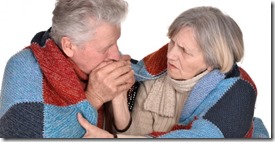 Last week I hosted an early morning meeting of care professionals at Senior Concerns.
Last week I hosted an early morning meeting of care professionals at Senior Concerns.
As we sailed into the second hour of our meeting and the early morning coolness gave way to summer heat, many of us in the room were sweating.
When I asked why the room’s air conditioning hadn’t kicked in, I was told the thermostat was set at 78 degrees, as our Adult Day Program participants like it hot.
No surprise here—thermostat wars happen every day at Senior Concerns.
One person’s temperature comfort zone is different than another’s. When I asked the question though, I was reminded that, when it comes to our senior visitors, most like it nice and warm.
I decided to do some research on why so many seniors prefer sauna-like conditions.
I learned that babies and older people generally lose heat more easily through their skin because there is less fat and muscle to insulate them. If a senior is very thin, they will experience cold much more than seniors with a little more “meat on their bones.”
But that isn’t the only reason many seniors enjoy warmer temperatures.
In cold conditions, including sitting for long periods in air conditioned rooms, older muscles can become stiff, cause pain and restrict ease of movement—one reason warmer temperatures might feel better to an older person.
There are also various medical conditions that can make seniors feel chilly.
Anemia occurs when an individual’s system can’t make enough normal red blood cells to carry oxygen throughout the body, and that condition can make a person feel chilled. Other conditions like low blood pressure, congestive heart failure and poor circulation can result in less blood flow to hands and feet, causing individuals to feel chilly.
An underactive thyroid can also cause a feeling of cold. Blood vessel disorders like arteriosclerosis, which is the narrowing of blood vessels, or Raynaud’s disease—spasms of arteries to the fingers and toes—can also cause extremities to feel chilled.
Kidney damage resulting from diabetes can result in feelings of cold all the time.
Some medications can also cause a senior to feel chilled such as warfarin, sold under brand names Coumadin and Jantoven, often prescribed to prevent blood clots.
Vitamin deficiencies can also cause seniors to experience chilliness.
Researchers have found that people who are deficient in vitamin B may find themselves more sensitive to cold temperatures. A B-12 deficiency can be caused by a number of conditions, including an unbalanced diet.
Iron also plays a role in whether a person feels chilled. Symptoms of an iron deficiency may include fatigue, weakness and dizziness, and intolerance to cold temperatures, as well as cold hands and feet.
Some individual behaviors may also result in feeling chilled, such as skipping meals. If the body takes in too few calories, it conserves energy and produces less heat.
Not getting enough sleep and, as a result, feeling tired all the time, as well as not staying hydrated, can also interfere with a person’s ability to maintain temperature control. And an overabundance of caffeine and nicotine can constrict blood vessels and cause chilliness.
Given all the reasons a senior might have for feeling cold, it is no wonder so many seek retirement in places like California, Arizona and Florida.
The entrepreneur in me is thinking: How we can develop new ways to help seniors stay warm while not leaving the rest of us soaked with perspiration? Of course there are sweaters, shawls, zip-front sweatshirts, lap blankets and snuggly warm slippers.
But what about a neck wrap that provides gentle continuous warmth? Or a fake “cup of tea” that they could wrap their fingers around to feel the warmth? Or a stuffed dog or cat that has built-in warmers to keep by their side or on their feet?
The next time I enter a senior’s residence and it’s 80 degrees, I will have greater empathy for why they live in a sauna, and who knows, maybe by then I’ll a have a new invention to make them more comfortable.
More ...
Tags: why seniors like heat